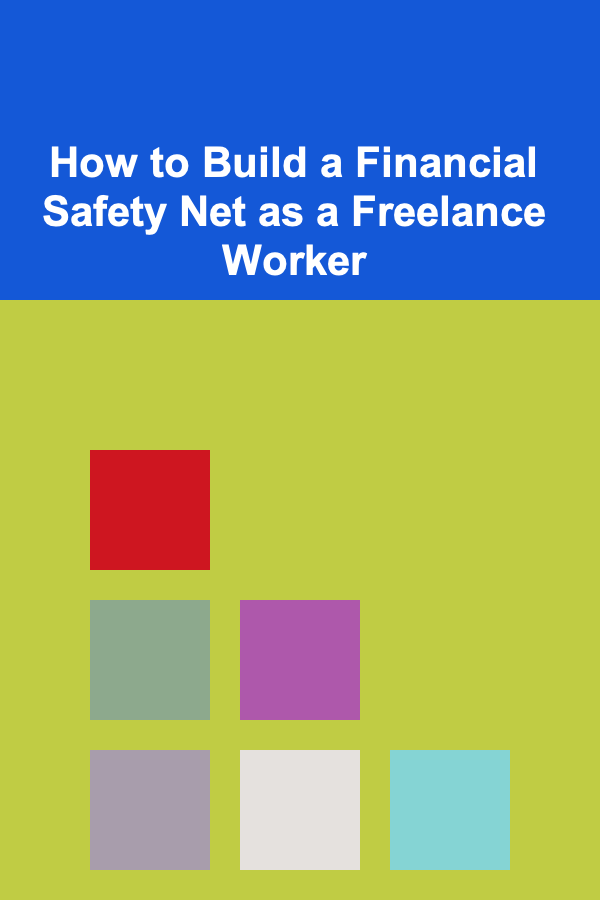
How to Build a Financial Safety Net as a Freelance Worker
ebook include PDF & Audio bundle (Micro Guide)
$12.99$9.99
Limited Time Offer! Order within the next:

Freelancing offers a unique way of working, filled with flexibility, autonomy, and the potential for greater income. However, it also comes with significant risks, especially when it comes to financial security. Unlike traditional employees, freelancers don't receive regular paychecks, health benefits, retirement plans, or job security from an employer. This makes building a strong financial safety net all the more crucial for freelance workers. Without it, freelancers face financial instability during slow periods or unexpected emergencies.
In this comprehensive guide, we'll explore how freelance workers can build a financial safety net, covering the importance of financial planning, savings strategies, emergency funds, retirement savings, and insurance. By following these principles, freelancers can protect themselves from financial uncertainty, ensuring long-term success in their freelance careers.
The Importance of a Financial Safety Net for Freelancers
Before diving into the practical steps of building a financial safety net, it's important to understand why it is particularly vital for freelancers. Traditional employees typically receive a regular paycheck, meaning they can count on a steady income stream. Freelancers, however, may experience fluctuating incomes based on the number of clients, projects, or work hours they secure. This variability can cause financial stress, especially if a freelancer lacks savings or other forms of financial protection.
Having a solid financial safety net offers several benefits:
- Protection Against Income Gaps: Freelancers often face lean periods where there are fewer clients or projects. A safety net ensures they can continue to cover their living expenses during these gaps.
- Ability to Handle Unexpected Expenses: Life is unpredictable. Emergencies such as medical bills, home repairs, or other unforeseen costs can arise at any time. With a financial safety net, freelancers can navigate these unexpected expenses without sacrificing their financial well-being.
- Peace of Mind: A financial safety net brings peace of mind, allowing freelancers to focus on their work without constantly worrying about financial stability.
- Long-Term Security: A strong financial safety net ensures that freelancers are not only protected in the short-term but also prepared for the long-term, including saving for retirement, investing, and building wealth.
By creating a financial safety net, freelancers can mitigate the risks that come with freelancing, allowing them to work with more confidence and peace of mind.
Step 1: Track Your Income and Expenses
One of the first and most important steps in building a financial safety net as a freelancer is to gain a clear understanding of your income and expenses. Freelancers often have irregular income, so it's essential to track cash flow carefully to identify patterns, anticipate lean periods, and plan accordingly.
Income Tracking
Freelancers should track all sources of income, including payments from clients, projects, and any passive income streams they may have. For a clearer picture, it's helpful to categorize income into:
- Core Income: The steady payments that come from ongoing clients or regular projects.
- Variable Income: Payments that vary, depending on the type and number of clients or jobs.
- One-Off Payments: Payments that are received for short-term or freelance gigs that don't recur on a regular basis.
Understanding your income stream can help you identify how much money you typically make in a month, quarter, or year. This data can be used to estimate future income and forecast your cash flow, enabling you to plan your finances more effectively.
Expense Tracking
Tracking expenses is just as important as tracking income. Freelancers typically face a variety of business and personal expenses, including:
- Business Expenses: Equipment, software, office space (if applicable), marketing, networking, and any other tools or services required for freelancing.
- Personal Expenses: Rent or mortgage, utilities, groceries, insurance premiums, transportation, etc.
- Taxes: Freelancers are responsible for paying self-employment taxes, which means setting aside money throughout the year for tax purposes.
Using a budgeting app or spreadsheet, freelancers can categorize and monitor their expenses, allowing them to determine how much of their income is being spent on business-related and personal costs. This tracking also helps to identify areas where savings can be made, enabling freelancers to allocate more towards building their financial safety net.
Step 2: Build an Emergency Fund
An emergency fund is one of the most crucial components of a financial safety net. It acts as a buffer during periods of low income or unexpected financial setbacks. The key to building a strong financial foundation is to have enough money set aside to cover essential living expenses for several months in case of an emergency.
How Much Should You Save?
A common recommendation is to aim for at least 3 to 6 months' worth of living expenses in your emergency fund. This should cover your essential personal and business expenses, including rent, utilities, food, healthcare, and transportation. If you experience a significant drop in income or face an unexpected financial hardship, your emergency fund will allow you to continue paying bills and maintaining your lifestyle without having to worry about cash flow.
Freelancers should also factor in business expenses when calculating their emergency fund. If your freelance business requires specific tools or equipment, or if you rely on certain software subscriptions, it's essential to account for those costs as well.
How to Build an Emergency Fund
Building an emergency fund requires discipline and planning. To start, review your monthly budget to determine how much you can realistically set aside for savings. Even if you can only save a small amount each month, consistency is key. Over time, these small contributions will add up, allowing you to build a safety cushion that can protect you in tough times.
- Automate Savings: Set up an automatic transfer to a separate savings account each time you receive payment from a client. By automating your savings, you ensure that you're consistently contributing to your emergency fund, without having to think about it.
- Cut Unnecessary Expenses: Review your personal and business expenses to identify areas where you can cut back. Eliminating non-essential costs allows you to allocate more money toward your emergency fund.
- Increase Income: Consider finding ways to increase your income by taking on more clients, projects, or other freelance gigs. Use the additional money to build up your emergency fund more quickly.
Step 3: Plan for Taxes
As a freelancer, you're responsible for paying your own taxes, which includes income tax and self-employment tax. Failure to plan for taxes can lead to financial problems down the line, especially when tax season arrives and you're hit with a large bill.
Set Aside Money for Taxes
To avoid tax surprises, it's essential to set aside a portion of your income throughout the year. A good rule of thumb is to set aside 20% to 30% of your gross income for taxes. This ensures that you have enough funds available to pay your tax bill when it's due.
- Open a Separate Savings Account for Taxes: To avoid spending the money earmarked for taxes, open a dedicated tax savings account. Deposit a percentage of each payment into this account, so you're not tempted to dip into it.
- Keep Track of Deductions: Freelancers can deduct certain business expenses, such as office supplies, software, and other tools necessary for their work. Keep track of all expenses to ensure you're claiming the maximum deductions allowed by the IRS.
- Consult a Tax Professional: Freelancers often face complex tax situations, so it may be beneficial to work with a tax professional who can help you navigate tax laws, maximize deductions, and avoid penalties.
Plan for Quarterly Tax Payments
In the United States, freelancers are required to make quarterly estimated tax payments to the IRS. These payments are due in April, June, September, and January of the following year. If you don't make these payments, you may be subject to penalties. Keep track of your income and taxes owed to ensure that you're prepared for each quarterly tax payment.
Step 4: Save for Retirement
Freelancers often don't have access to employer-sponsored retirement plans, such as 401(k)s, which means they must take matters into their own hands when it comes to retirement savings. Building a retirement fund is essential to ensure that you have enough money to live comfortably in your later years.
Options for Retirement Savings
Fortunately, there are several retirement account options available to freelancers:
- Traditional IRA: A tax-deferred retirement account that allows you to contribute up to $6,500 per year (in 2025). Contributions are tax-deductible, meaning you'll pay fewer taxes now and more taxes when you withdraw the funds in retirement.
- Roth IRA: A retirement account that allows you to contribute after-tax dollars, with tax-free withdrawals in retirement. The contribution limit for a Roth IRA is also $6,500 per year.
- Solo 401(k): A retirement plan designed for self-employed individuals. Solo 401(k) accounts allow higher contribution limits than IRAs, with the ability to contribute both as an employee and employer, potentially allowing you to contribute up to $66,000 per year (in 2025).
- SEP IRA: Another retirement plan option for freelancers, the SEP IRA allows you to contribute up to 25% of your net earnings, up to $66,000 (in 2025).
How to Build Your Retirement Savings
- Contribute Regularly: Aim to contribute consistently to your retirement accounts. The earlier you start saving, the more your money will compound over time.
- Maximize Contributions: If possible, contribute the maximum amount allowed to your retirement accounts. This allows you to take advantage of tax breaks and build a larger nest egg for retirement.
- Invest Wisely: Consider working with a financial advisor to develop an investment strategy that aligns with your retirement goals and risk tolerance. A diversified investment portfolio can help maximize your returns over the long term.
Step 5: Get the Right Insurance
While freelancers may not have access to employer-provided benefits such as health insurance or disability insurance, it's still crucial to protect yourself with the right types of insurance. Without insurance, a serious illness or injury can wipe out your savings and disrupt your ability to work.
Types of Insurance Freelancers Should Consider
- Health Insurance: Freelancers should purchase health insurance either through the Health Insurance Marketplace or through private insurers. Ensure that you have adequate coverage to protect against high medical bills.
- Disability Insurance: Disability insurance provides income replacement if you become unable to work due to illness or injury. It's especially important for freelancers, as they don't have sick leave or paid time off.
- Liability Insurance: Professional liability insurance protects freelancers against claims of negligence or mistakes made during the course of their work. This is particularly important for freelancers in fields such as consulting, writing, or graphic design.
Having the right insurance can help safeguard your financial stability in the event of unexpected health issues or other challenges, allowing you to focus on your work without unnecessary stress.
Conclusion
Building a financial safety net as a freelance worker is essential for long-term success and financial security. By tracking your income and expenses, building an emergency fund, planning for taxes, saving for retirement, and getting the right insurance, you can create a robust financial foundation that protects you from life's uncertainties. With the right planning and discipline, freelancers can enjoy the freedom of self-employment while also ensuring financial stability and peace of mind.

How to Analyze Market Trends to Stay Ahead of the Competition
Read More
How to Make Money by Licensing Your Deep Learning Models
Read More
How to Manage Pet Costs: Budgeting for Pet Care
Read More
How to Save Money on Your Mortgage and Home Loan Payments
Read More
How to Understand the Brain's Role in Language Development
Read More
Navigating Complex IT Environments: Best Practices for IT Directors
Read MoreOther Products

How to Analyze Market Trends to Stay Ahead of the Competition
Read More
How to Make Money by Licensing Your Deep Learning Models
Read More
How to Manage Pet Costs: Budgeting for Pet Care
Read More
How to Save Money on Your Mortgage and Home Loan Payments
Read More
How to Understand the Brain's Role in Language Development
Read More